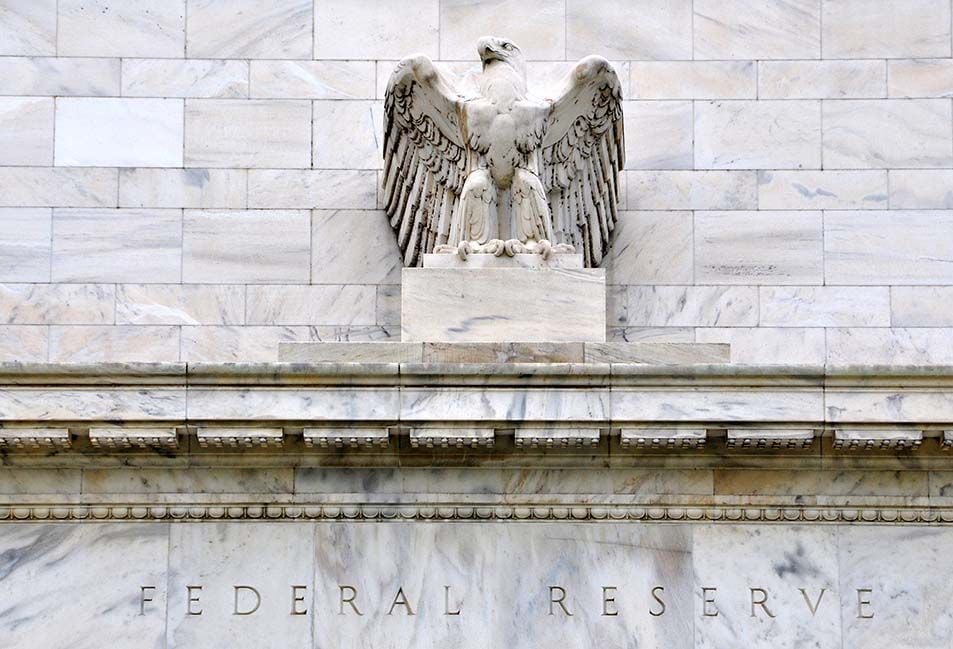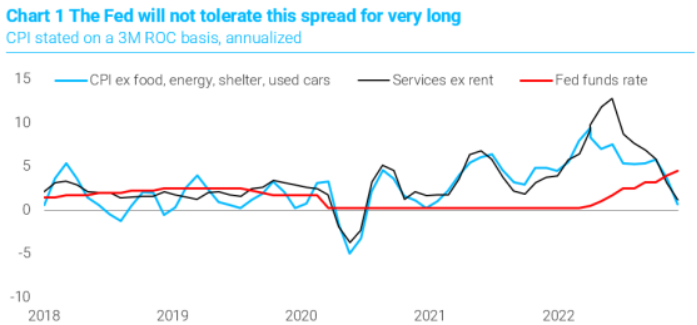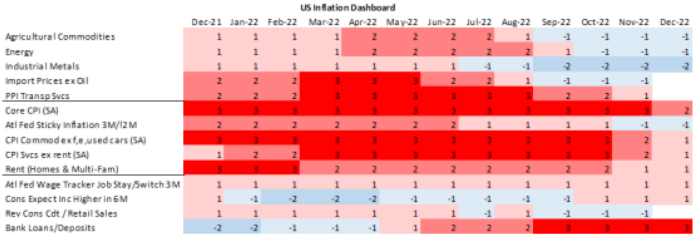U.S. Inflation Moderation Bolsters Forecasters' Confidence in 'Fed Pause'
- Written by: James Skinner
"All this inflation deceleration will ultimately prove transitory, especially because the Fed will feed the inflation cycle that follows by acting on the belief that a soft-landing has been achieved and the “new normal” has returned" - TS Lombard

Image © Adobe Stock
Moderating inflation in the all-important U.S. services sector has led some independent research consultancies to become more confident in earlier forecasts that February's anticipated interest rate rise from the Federal Reserve (Fed) will be its last for at least a period of time.
U.S. inflation met consensus expectations when falling from 7.1% to 6.5% in December but it's possible that price growth would have fallen even further if not for a large year-end increase in housing costs known as shelter prices.
But rising shelter prices are a temporary side effect of earlier increases in the Fed Funds interest rate and Federal Open Market Committee members expect them to come down again in the months ahead, potentially intensifying the downward pressure on the overall inflation rate.
What's more, even when including this higher-than-usual housing inflation, so-called core inflation had already fallen close to levels that would be consistent with the Fed's two percent target if sustained over time.
"That was the best performance since the third quarter of 2021, just before core inflation was driven up by continued margin expansion and the summer surge in wage growth," writes Ian Shepherdson, chief economist at Pantheon Macroeconomics, in a Friday research briefing.
 Source: Pantheon Macroeconomics. Click image for closer inspection.
Source: Pantheon Macroeconomics. Click image for closer inspection.
"If sustained at this pace, core inflation would settle at 3.1%, still above the target but a long way down from the current 5.7% year-over-year rate, never mind September’s 6.6% peak. But this rate of increase will not be sustained; it likely will slow markedly over the course of this year," he adds.
Shepherdson said on Friday the "entire increase" in last month's core inflation rate was the result of housing costs rising and that U.S. inflation could slow rapidly in the months ahead owing to multiple factors including the trend lower in wage growth encapsulated in the lefthand chart above.
Adding to the anticipated decline is scope for sharp falls in used vehicle prices that remain 20% above their pre-pandemic trend levels and which account for close to 5% of the overall consumer price index inflation rate.
GBP to USD Transfer Savings Calculator
How much are you sending from pounds to dollars?
Your potential USD savings on this GBP transfer:
$1,702
By using specialist providers vs high street banks
"These data overall leave us happy with our call for a 25bp rate hike on February 1, and then no change in March," Shepherdson says.
"The latter is contingent, though, on a material slowing in job growth in January and February, and we’re much less confident of that than with the idea that core inflation is now properly slowing," he adds.
The Pantheon Macroeconomics team looks for the Fed to raise its interest rate to 4.75% in February, which would match the peak envisaged in the Federal Open Market Committee forecasts announced in September while coming in below the 5%+ level featured in December's set of projections.
 Source: TS Lombard. Click image for closer inspection.
Source: TS Lombard. Click image for closer inspection.
Forecasts from TS Lombard, another independent research consultancy, also second the above view but then diverge from those of Pantheon when it comes to the remainder of the year and medium-term outlook for U.S. interest rates.
"All this inflation deceleration will ultimately prove transitory, especially because the Fed will feed the inflation cycle that follows by acting on the belief that a soft-landing has been achieved and the “new normal” has returned," warns Steven Blitz, chief U.S. economist at TS Lombard, in a Thursday note.
"There are reasons to see current CPI reversals as passing. The Dashboard shows inflation's sources shifting from commodities to wages and credit, never as transitory a source of inflation as goods prices," he adds.
Blitz and colleagues expect the ongoing deceleration of inflation to lead the Federal Reserve to begin cutting its interest rate before year-end with this ultimately leading to a renewed upturn for inflation in subsequent months and forcing the bank to raise rates again.
Chairman Jerome Powell and some other members of the FOMC have warned against this approach frequently of late, citing the Fed's experience in the late 1960s and throughout the 1970s; both decades in which hasty rate cuts were eventually reversed with interest following renewed increases in inflation.




